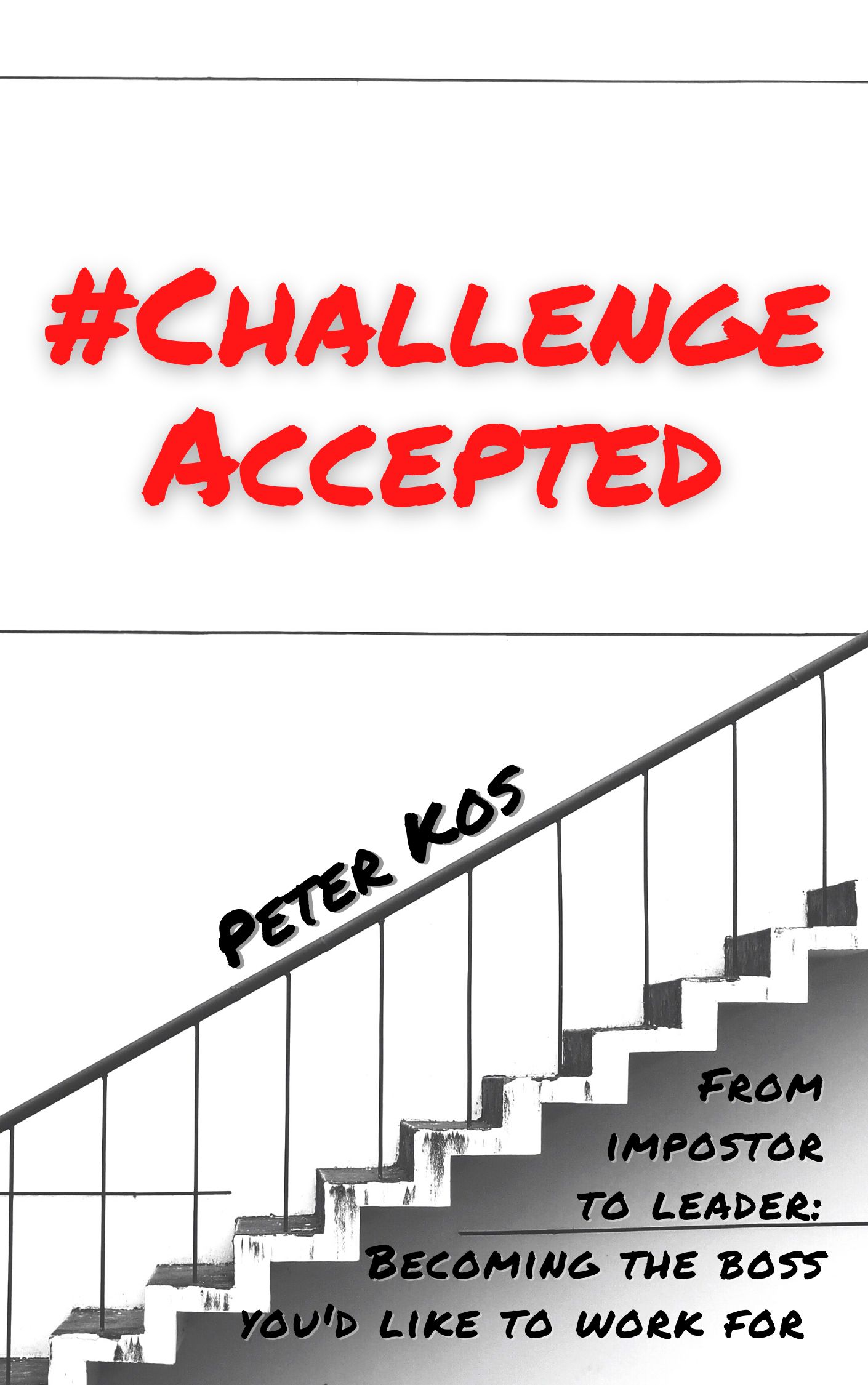Challenge Accepted: pre-announcing my second book.
Pre-announcing my 2nd book: Challenge Accepted. From impostor to leader: becoming the boss you'd like to work for.

From impostor to leader: becoming the boss you'd like to work for.
There seems to be a natural progression, a corporate evolution if you’d like, to go from an individual contributor to a manager. Many people want to enter the corporate management ranks, and it’s not always for the right reasons. Career aspirations, better pay, being a boss.
And the way we get promoted isn’t necessarily the best. You see, typically, you do a great job in your role, and you get rewarded with a promotion to a manager. My experience stems mostly from sales organizations, but I’m sure it’s the same across the board — the best individual contributors don’t necessarily make the best managers.
And the opposite is true as well — being a manager doesn’t require experience in any of the things your team is doing. Now, most people will frown upon the latter statement because nobody wants to be managed by “what does he know.”
But a manager’s job is communication and coordination. Those are the basics and the exact reasons why the best performers aren’t the best manager material.
The Peter Principle
The so-called Peter Principle (no relation to me; I hope) observes that people in the hierarchy tend to rise to their level of incompetence. It says that employees are promoted based on their success in their previous jobs until they reach a level at which they are no longer competent because skills do not translate to the new role.
This doesn’t necessarily happen in the first hop of promotions, but it will, as we get promoted based on the current competence to the next level, thus eventually reaching a “Peter’s Plateau” or the final placement where we are stuck because of lack of competence for the next promotion.
Once you get promoted from a sales role, you soon realize it’s not all roses. For one, as an individual performer, you’re responsible for your own success. It’s your sales performance that dictates your commissions and pay. But now, it depends on other people’s performance. Instead of just you doing your best, you need to have your whole team do their best.
Micro-management
Managing means giving up some control, and the people who fail to realize that are known as micro-managers.
Micro-manager is Latin for a person who already reached their Peter’s Plateau. And that’s a problem because very few organizations are set to demote their managers without firing them. And let’s face it, “going back” from the officers ranks takes a big man (or woman). Most of us aren’t capable of doing that.
Impostor syndrome
Being promoted to a manager is a big step, a nice milestone in a person’s life. It’s a recognition, an achievement, a proud moment. Yet, once the hangover wears off, you face a severe emotional struggle. There’s doubt—the impostor syndrome, especially when you’re promoted from within and have to manage your former peers. There are fear and doubt. “Should I treat them differently now? What if they find out? Are they really happy for me, or jealous, or resentful?! Will I still be a part of the pack?” I’ll tell you based on my personal experience — every first-time manager faces those doubts.
Stress, fear, doubt.
There’s a tremendous amount of pressure from your direct reports, as well as from above. You don’t want to disappoint people who promoted you. You’re afraid of failure. You’re not sure whether you’re supposed to do things the same as the previous person did or invent something new. What if it doesn’t work?
The worst thing is that most of us have nowhere to go. It’s tough to express your self-doubt and concerns as you don’t want to look weak or not ready. You can’t go to your former peers, and you’re afraid to go to your boss. Most of us turn to books.
Paradox of choices
Now, let me be clear that my firm belief is that the best thing to do would be to go exactly where you don’t want to — to your team, former peers (if not the same), and to your direct superiors. Maybe even a level higher. This is the time to get coached, seek wisdom, and admit doubts. But I haven’t yet met a young first-time manager with enough self-confidence to do these steps. Especially men, we are so weak when it comes to emotions. And women aren’t much better off either — those who take such steps get judged as incompetent. Any action might be right or wrong, and you have to make a decision. Welcome to management.
Choose what you read
Tons of books have been written on how to go about your managerial route. I’ve read all of them and learned a few things along the way. First, discard whatever is written by academics and is based purely on research. They might collect tons of data and survey everyone, but it’s all academia bullshit.
Becoming a manager, and what we’re all striving for — a leader — takes human and social skills, and the best people to teach us that are the ones who’ve been there. Biographies, memoirs, handbooks based on empirical experience tend to be the best. Very few contain straightforward advice as they’re mostly a collection of wisdom and experience, so you’ll have to do your homework, digest plenty of material and figure it out for yourself.
80% of the managerial job contains those dreaded soft-skills, a cocktail of known unknowns mixed with plenty of unknown unknowns.
That’s the secret sauce you have to mix yourself. There are plenty of recipes, but none are guaranteed to work for you.
So which ones to read? I’m compiling a list of books that gave the most value for me, combined with some learning and experience from the mistakes I’ve made myself. The best advice I can dispense is, practice an open, growth-mindset, and accept that it’s a lifelong learning. You’re never done.
Pre-announcing my second book
I’ve got tons of handy advice — some even written down already, and I realized there’s a whole book’s worth of this shit. So yes, that’s going to be my second book: a guide, a handbook for helping people navigate their ways from the first-time manager to a leader. I’ll try to write it in way to become that buddy we all need(ed) but were afraid to ask.
I’ve got the outline and at least 25 chapters’ worth of ideas. I want to make it easily digestible for someone who wants to get some quick tips, so I’ll strive to make chapters less than 1500 words — that’s five minutes of reading, or about the attention span of a typical sales manager.
I’ll share more details in the coming weeks, but here’s the cocktail party pitch (or an elevator pitch, if you like):
Every first-time manager feels like an impostor, and they don’t want to be just a manager — they want to become a leader. This handbook helps them master delegation, coaching, influence, and other leadership skills to navigate this journey.
Stay tuned.








